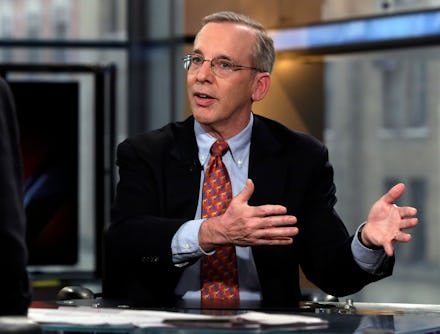Wall Street's Top Regulator Just Sent a Strong Message to Big Banks

One of the country's top regulators has harsh words for Wall Street: Get your act together or face the possibility of downsizing.
William C. Dudley, president of the Federal Reserve Bank of New York, delivered this message Monday at a workshop focused on the culture of big banks. A number of top executives, including Morgan Stanley chairman and CEO James P. Gorman, were present.
"If those of you here today as stewards of these large financial institutions do not do your part in pushing forcefully for change across the industry, then bad behavior will undoubtedly persist," he said. "If that were to occur, the inevitable conclusion will be reached that your firms are too big and complex to manage effectively."
A former longtime economist for Goldman Sachs, Dudley is well versed in the culture of the risk-taking endemic and its potentially disastrous consequences in the financial sector. He's also been critical in the past of the risk-taking that occurred in the run-up to the 2008 financial crisis.
"I reject the narrative that the current state of affairs is simply the result of the actions of isolated rogue traders or a few bad actors within these firms," he said. "The problems originate from the culture of the firms, and this culture is largely shaped by the firms' leadership."
But what can he actually do? Federal reserve banks are designed to be the government's regulatory arm — they're the institutions responsible for keeping watch over the country's biggest financial players. The New York branch is the largest and most influential, so Dudley does have power — his statement about downsizing carries the threat of real action behind it.
Luckily for the rest of us non-bankers, Dudley appears to have a plan. It focuses on bonuses — a much-maligned issue during the 2008 financial crisis — and an expansion on whistleblowing in the industry.
He suggested top executives shouldn't have the option of running away with their bonuses before their companies encounter losses or fines; they would only be awarded in full after 10 years, and those losses or fines could come out of the bonus itself. He also proposed that lower-level bankers be subject to an evaluation system that rates their "ethics and compliance," according to CNN.
He could take a page from his own book. Earlier this month, the Fed came under scrutiny for its apparent lack of action against Goldman Sachs, one of the world's top banks, despite a "legal, but shady" deal the financial institution was pursuing.
Secret tapes recorded by former Federal Reserve examiner Carmen Segarra revealed that the government institution responsible for reigning in the financial sector was having issues doing just that.
"[The tapes] portray a New York Fed that is at times reluctant to push hard against Goldman and struggling to define its authority," wrote ProPublica, which helped make the tapes public.
Even when there is an institutional will, federal reserve banks can often miss the signs of trouble completely. According to a report by the Fed's Office of Inspector General, the Federal Reserve knew about the risks J.P. Morgan faced from certain credit derivative exposure as early as 2008 but "failed to act properly to head them off."
"One of the key flaws it uncovered in its probe of the so-called London Whale case was the New York Fed's over-reliance on certain personnel, who left the supervisory team in 2011," Reuters reported. "That created a 'significant loss of institutional knowledge' within the New York Fed team assigned to inspecting J.P. Morgan."
Someone's gotta do it. Whether it ends up being Dudley or someone else, it's abundantly clear at this point that the culture permeating Wall Street's biggest banks needs a fix.
His words Monday, at least, seemed to make an impression: The New York Times reported that one guest said "the executives in attendance were unnerved" by the part of his speech that addressed downsizing their prized banks.
"It is up to you to address this cultural and ethical challenge," Dudley said. "So let's get on with it."